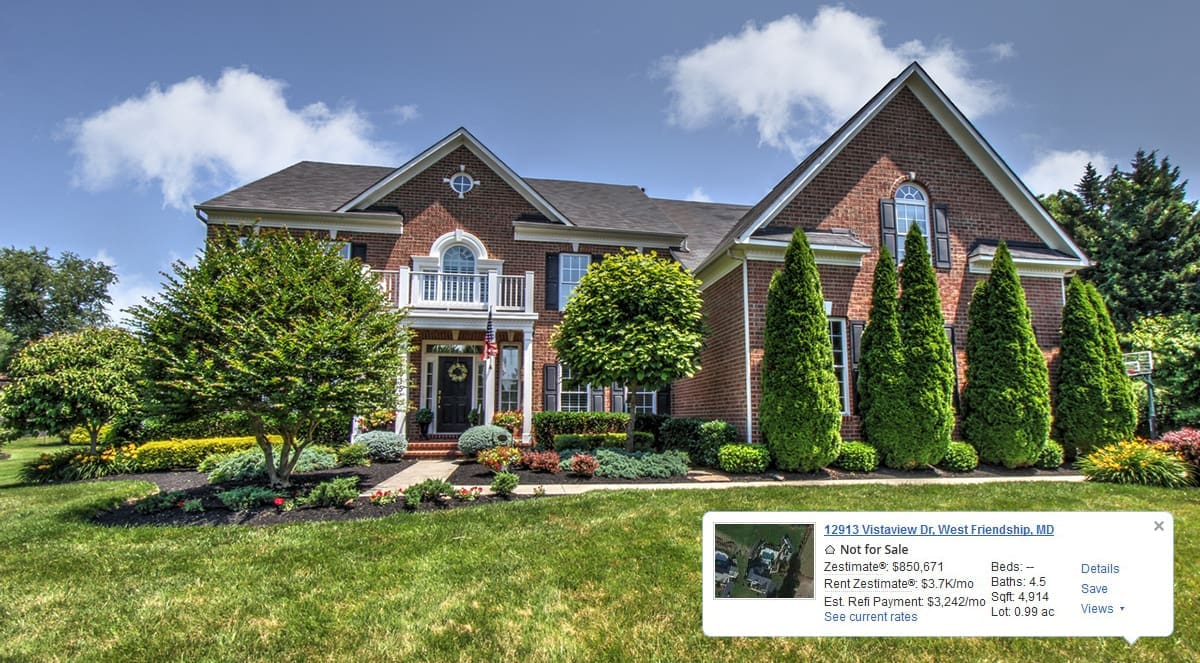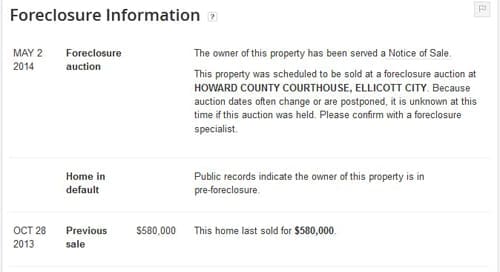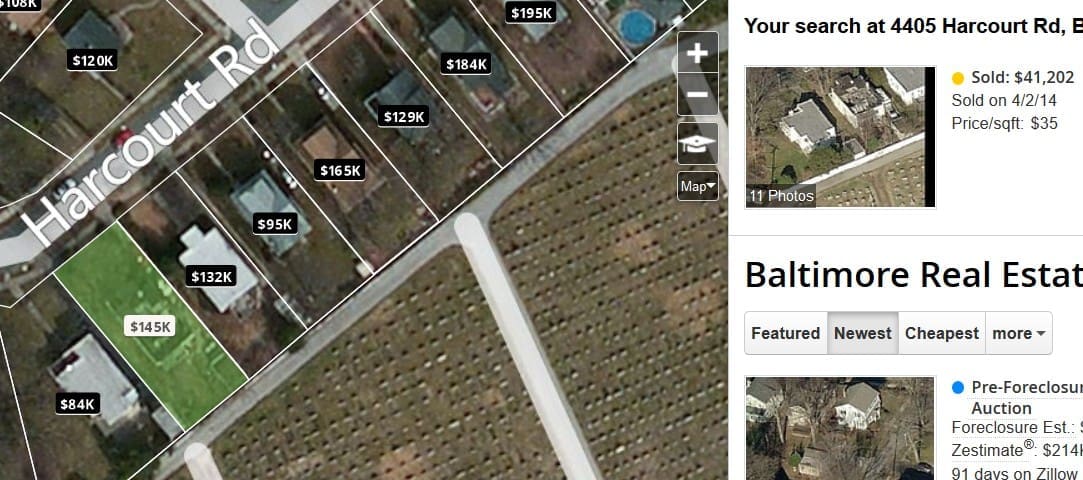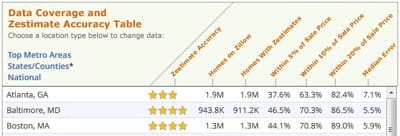Editor's Note: For the purposes of this article I will refer to Zillow and Trulia simply as Zillow since they are merging and to make the article a little easier to understand - but keep in mind the information below is applicable to both of these websites.
Zillow and Trulia have become very popular recently in the news and among potential home buyers and sellers and are the go to sources for millions of consumers considering buying or selling a home. Homebuyers and sellers I’ve spoken with love Zillow because of the different tools they offer and the bevy of information the site offers. Consumers feel like they can learn everything they need to know about a home and neighborhood by looking these properties up on Zillow.
There’s only one problem – most of their information is wrong. And Zillow knows it. And they don’t care.
Of course I understand that Zillow only really cares about Zillow and they are out to make as much money as quickly as they can. That’s all well and good for their employees and shareholders. The reason I am so passionately against them is because millions of consumers have been tricked into thinking the Zillow information is reliable and are basing life-altering decisions on it.
Let’s look at an example of a recent listing of mine (I’ve gotten into the habit of looking up the “Zestimate” value of properties I list before I put them on the market to see how inaccurate their information is).
I’ve spoken with dozens of potential home sellers who decided not to sell their homes and proceed with plans to move for jobs, down-size, change school districts, etc. because when they researched their homes on Zillow they thought they couldn’t sell for enough to purchase another home and move on with their plans.
Let's look at an example of a recent listing of mine to give you an idea of just how inaccurate this information can be. I recently listed the property below in West Friendship, Maryland. Zillow estimated the property was worth $851,000 which you can see from the screen capture information inset on the picture). I listed this property for $975,000, had multiple offers and sold the property for over $970,000 in 8 days. If the sellers had gone by the Zillow data and tried to sell it themselves they would have lost $125,000. In a more common scenario, this home seller may have looked at Zillow and decided that at $851,000 it didn't make sense to sell and wouldn't even bother speaking to a real estate professional to find out what the true value and marketability of the home was.

Are you sure you're looking at foreclosures?
 Even more damning and ridiculous is the public record information Zillow offers. Again, I researched a property I was about to list for sale in Laurel, Maryland on Zillow to see what the Zestimate said. To my surprise I saw the notification you see here indicating that the property was in foreclosure. Mainly I was surprised because I had previously helped this homeowner purchase the home and he had paid cash for it. Obviously since there was no mortgage, there would be no foreclosure or threat of foreclosure.
Even more damning and ridiculous is the public record information Zillow offers. Again, I researched a property I was about to list for sale in Laurel, Maryland on Zillow to see what the Zestimate said. To my surprise I saw the notification you see here indicating that the property was in foreclosure. Mainly I was surprised because I had previously helped this homeowner purchase the home and he had paid cash for it. Obviously since there was no mortgage, there would be no foreclosure or threat of foreclosure.
Maybe this doesn't seem like much of an issue. After all, it is just a small mistake on a completely independent, uninvolved website, right? How could that affect the home seller. During our first open house, nearly a third of the potential home buyers who came through the house mentioned how great the condition of the home was considering it was a foreclosure. A couple asked how low they could offer since it was a foreclosed property. We had to overcome a psychological shift in potential home buyers' predisposition to the property because Zillow falsely indicated the status of the home.
Property Condition
Every single traditional sale I've ever sold had a lower Zillow estimate than the final sales price. That won't always be the case, however. For instance, let's look at one last example that will definitively prove how worthless Zillow is. As you can see from the picture below, the property on 4405 Harcourt Rd is estimated by Zillow to be worth $145,000. It sold for $41,000 in April. That's a difference of $104,000. What Zillow doesn't know about this property is that the home actually burned down a couple of years ago and was torn to the ground. So the "house" that Zillow says is worth $145,000 is actually a vacant lot with no home on it.

So, if Zillow can't differentiate the difference in condition from a burned down shell of a home that needs to be torn down to a move-in ready home next door it certainly can't differentiate the nuances of a buyer's perspective of a home that needs general updating.
Just how bad is their information?
 In this table, which is from Zillow’s own website you can see that in Maryland, less than half of their estimates are within 5% of the final sales price (again, this does not take seller credits into account so once that is taken into account their accuracy is even more dramatically off). Only two thirds of their estimates are within 10% of the final sales price. As pathetic as those numbers are, Maryland is considered one of their "4 star" areas meaning that is the most reliable Zestimate statistics they have. Imagine how off these numbers are in other parts of the country. That means for every 100 houses in Maryland in the $400,000 range, Zillow is within $20,000 of the real value less than half of the time.
In this table, which is from Zillow’s own website you can see that in Maryland, less than half of their estimates are within 5% of the final sales price (again, this does not take seller credits into account so once that is taken into account their accuracy is even more dramatically off). Only two thirds of their estimates are within 10% of the final sales price. As pathetic as those numbers are, Maryland is considered one of their "4 star" areas meaning that is the most reliable Zestimate statistics they have. Imagine how off these numbers are in other parts of the country. That means for every 100 houses in Maryland in the $400,000 range, Zillow is within $20,000 of the real value less than half of the time.
The issue with Zillow's data is that it is entirely generated from public records and has no mechanism to adjust for property condition, location or any other vital factor in determining a property's value. And like I said earlier, they don't care. On their own website, on the "fine print" page they write "It is a starting point in determining a home's value. The Zestimate is calculated from public and user submitted data; your real estate agent or appraiser physically inspects the home and takes special features, location, and market conditions into account."
Why don't they care their information is so bad?
To understand why Zillow churns out inaccurate data without a care as to how it may be affecting consumers, you have to understand how Zillow makes their money. Zillow sells advertising to real estate agents. Each time you look at a property and see the agent profiles on the page, those agents are typically paying hundreds and sometimes thousands of dollars a month to appear on those websites. Zillow charges these rates based on "page views," which is the number of times consumers look at the website. So, the more pages Zillow provides, the more pages they can sell which leads to bigger profits.
And again, they're not ashamed of admitting it. One of Zillow's PR staff recently posted on another agent's blog: "At the end of the day- the Zestimate drives traffic to the site and agents want the biggest audience possible for their listings and consumers feel empowered if they have information. Of course they need an agent to best know how to interpret this information."
Of course this is a complete sham. If their site is telling someone their home is worth $851,000 but that they need to speak to an agent to find out the house is really worth over $970,000, why do you need their site to begin with?
I could go on for days with examples of all of the ways Zillow is perpetuating incorrect information to the public but I believe these examples do a pretty good job of getting the point across. Hopefully this information is useful for you and helps give you some clarity about Zillow. As always, if you have any questions at all or if you would prefer to speak to an actual real estate agent instead of an inaccurate website, please don't hesitate to let me know - I'm happy to help!
